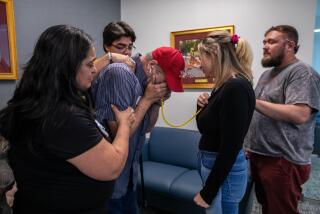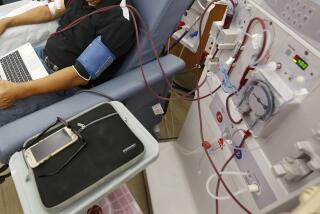Body Organ Sales Discussed as Way to Increase Supply
- Share via
DETROIT — About 300 international medical, legal, ethical and philosophical experts gathered Monday at the University of Michigan in Dearborn for a two-day seminar to debate whether the dearth of donor organs can be solved by paying people while they are alive for donations promised at death.
Every day, five to seven people die when waiting for organ transplants, and every 30 minutes the national transplant waiting list grows by one more patient.
Every year, only about 4,500 donors are used for almost all of the 15,000 whole-organ transplants performed in the United States.
The experts plan also to discuss whether people should be allowed to sell their organs and whether such agreements could be carried out without family permission.
“In India, they sell organs. Of course, that’s illegal here,” said Eleanor Forlenza, administrator of the Transplant and Health Policy Center at the University of Michigan in Ann Arbor.
“There’s a squeamishness about letting people sell a kidney . . . for monetary gain. Shouldn’t people have this choice?” said James Blumstein, a law professor at Vanderbilt University.
“There’s a tremendous need for organs. The demand exists,” said Blumstein, who will debate organ commerce today. “Let’s have a five-year trial in a few states and see what happens.”
But Blumstein acknowledged that there are serious questions about allowing a free market in human livers or kidneys. Poor people and the Third World could end up being used as organ farms for the wealthy, or people could risk their health by selling a kidney. He said it would also open the possibility of preferential treatment for the rich.
One way to shore up donations might be to give people stipends, maybe paying $50 or $100 toward their health insurance, in exchange for donations when they die, Blumstein said.
“If a donor has sold his organs . . . this is a done deal” and relatives could not object, he said.
Dr. Jeremiah Turcotte, a University of Michigan surgery professor and director of the transplant policy center, blames the donor dearth on the fact that families are insensitively asked to donate when a loved one dies, and other factors such as nervousness.






